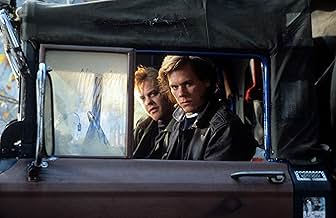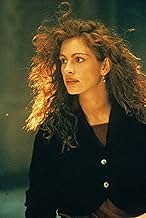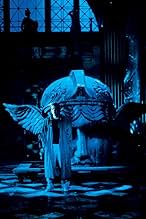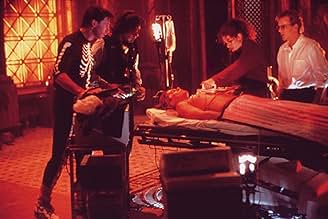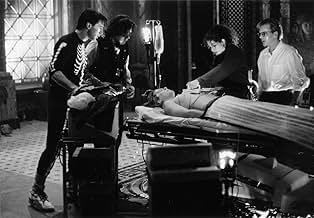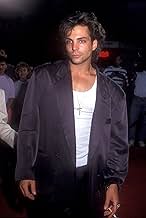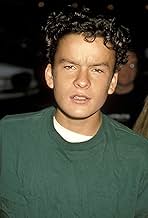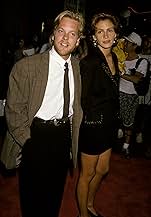Five medical students experiment with "near death" experiences, until the dark consequences of past tragedies begin to jeopardize their lives.Five medical students experiment with "near death" experiences, until the dark consequences of past tragedies begin to jeopardize their lives.Five medical students experiment with "near death" experiences, until the dark consequences of past tragedies begin to jeopardize their lives.
- Nominated for 1 Oscar
- 3 nominations total
John Duda
- Young Labraccio
- (as John Joseph Duda)
- Director
- Writer
- All cast & crew
- Production, box office & more at IMDbPro
Featured reviews
As the remake is coming out this week, I want to see how the original did, and I am not disappointed. This movie is a thriller without gore. The idea of forcing near death experience is intriguing and the stories around the characters are interesting. But what made it super special is that it featured the best stars at the time -- Julia Robert, Kevin Bacon, Kiefer, Oliver Plat and William Bacon, all together in one movie. And all the stars delivered their great performances. As for the remake, the bad news is it is very hard for it to surpass the original as the latter set such a high standard. But the good news is we can always have the original to be appreciated, in case the remake is a flop.
Kiefer Sutherland and Kevin Bacon showcase their talents and give compelling performances, as usual. This might even be one of Bacon's best roles. Unsurprisingly, Julia Roberts was the weakest part of the film, in terms of acting and casting. Oliver Platt proved himself to be a reliably consistent side-character actor, and William Baldwin's performance was decent to mediocre (at least better than Roberts'). The suspense was gripping throughout most of the film, from the "experiment" procedures to the after-math following each one. Overall this film was suspenseful, presented some interesting thoughts and ideas on a controversial subject, and provided some commendable performances. The premise was very provocative here and it was one of the earliest films to show Generation X's ambition despite the suppression by the Baby Boomers. It was also very true to the nihilism that embodies Generation X.
The basic premise of Flatliners is fairly simple. Several medical students put themselves at the point of death in order to find out exactly what the brain does during the fact. It sounds like something a mob of bored students would do for a joke, but it forms the basis of some very creepy substories. In today's world, where Hollywood has to mine foreign markets for the ideas to make a horror film, Flatliners is one of those rare gems that show Hollywood can make something different when it tries hard enough.
What separates Flatliners from a lot of films based on this premise that would come out today is that it does not stoop to being condescending or arrogant. Flatliners recognises that people go to films to be entertained, not moralised to. In this kind of supernatural thriller, the difference this restraint makes is really incredible. What's even more incredible is that Julia Roberts appears without being annoying or demonstrating that she can only play Julia Roberts. The theory of obscurity, that performing artists do their best work with the smallest audience, is in force here.
The subplots concerning what the characters find during their loss of pretty much everything that makes them alive, and how it comes back to intrude on their present time, are done surprisingly well. The moments when William Baldwin's character finds his personal videotape collection coming back to haunt him are especially intriguing. That William Baldwin seems so perfectly cast in the role says a lot either about the script or the direction. I am not sure which.
Kiefer Sutherland, on the other hand, really shines as the lead. One really feels for him as the mystery of what past experience is intruding on the present and why unfolds. As Kevin Bacon's character goes to find an old school pier whose life he made hell and tell her how sorry he is, it becomes clearer what the film is about. We can try to change the past as much as we like, but it's what we do with the present that matters most.
Another good aspect of Flatliners is how it achieves an atmosphere without the use of expensive, elaborate visual effects. Quite unusually for what is essentially a horror film, Flatliners did not expend its budget in places where it did not need to. Much of what we see during the more surreal sequences is a case of professional pretending, simple trick photography, or stock footage. Sometimes the simplest things are the best.
If there is a problem with the film, it's that it feels about ten minutes too short. The ending seems more perfunctory than conclusive, as if someone in the studio asked the director to wrap the film up so they can bring it out at a certain market time. Of course, many films have been left with sore spots for this very reason, so Flatliners shouldn't really need to be any different. The hundred and fifteen minutes we do get is highly satisfactory, though not overly brilliant.
I gave Flatliners a seven out of ten. It works well as a date flick or a kind of late-night popcorn film. That aside, it makes a good reminder that low-budget horror shows weren't always sad pieces of garbage.
What separates Flatliners from a lot of films based on this premise that would come out today is that it does not stoop to being condescending or arrogant. Flatliners recognises that people go to films to be entertained, not moralised to. In this kind of supernatural thriller, the difference this restraint makes is really incredible. What's even more incredible is that Julia Roberts appears without being annoying or demonstrating that she can only play Julia Roberts. The theory of obscurity, that performing artists do their best work with the smallest audience, is in force here.
The subplots concerning what the characters find during their loss of pretty much everything that makes them alive, and how it comes back to intrude on their present time, are done surprisingly well. The moments when William Baldwin's character finds his personal videotape collection coming back to haunt him are especially intriguing. That William Baldwin seems so perfectly cast in the role says a lot either about the script or the direction. I am not sure which.
Kiefer Sutherland, on the other hand, really shines as the lead. One really feels for him as the mystery of what past experience is intruding on the present and why unfolds. As Kevin Bacon's character goes to find an old school pier whose life he made hell and tell her how sorry he is, it becomes clearer what the film is about. We can try to change the past as much as we like, but it's what we do with the present that matters most.
Another good aspect of Flatliners is how it achieves an atmosphere without the use of expensive, elaborate visual effects. Quite unusually for what is essentially a horror film, Flatliners did not expend its budget in places where it did not need to. Much of what we see during the more surreal sequences is a case of professional pretending, simple trick photography, or stock footage. Sometimes the simplest things are the best.
If there is a problem with the film, it's that it feels about ten minutes too short. The ending seems more perfunctory than conclusive, as if someone in the studio asked the director to wrap the film up so they can bring it out at a certain market time. Of course, many films have been left with sore spots for this very reason, so Flatliners shouldn't really need to be any different. The hundred and fifteen minutes we do get is highly satisfactory, though not overly brilliant.
I gave Flatliners a seven out of ten. It works well as a date flick or a kind of late-night popcorn film. That aside, it makes a good reminder that low-budget horror shows weren't always sad pieces of garbage.
Hmmm.... Since I love Kiefer Sutherland so much, my review might be a little biased. He was, however, pretty good in Flatliners. A wonderful idea for a movie, and a great gothic-type thriller. Sutherland's guilt and fright at the return of boy he taunted terribly when he was young (I'll try not to give away the rest) seemed genuine, especially since he seems drawn more often than not to act characters that are a**holes (there was really no other way to put it). As a young medical school student, his research into life after death draws his friends into dangerous situations and a great finale. The medical school did seem a little sub-standard, though, I will admit. Kevin Bacon is great in Flatliners, as is one of my favorite sarcastic actors, Oliver Platt. William Baldwin's also a cutie and did okay, and though I'm not a Julia Roberts fan, so did she. The plot will draw you in and keep you on the edge of your seat, and there's an interesting dark atmosphere pervaded by a lot of red and blue for emotional impact. A good movie.. I'd give it at least an 8 out of 10
Flatliners has all the ingredients of a good Joel Schumacher film - intelligent, youthful characters, stunning cinematography, a gripping story, and excellent performances. It's escapist fun but it's done very well and resonates with a positive spiritual message despite the unnerving precedings.
Schumacher has a knack for spotting talented young actors, and all of the main five here have gone on to greater things (see the cast list). Their believable performances help to raise this movie well above average. Kiefer Sutherland shines in his egotistical med-student role.
The cinematography really stimulates the right side of the brain, which is what I love about Schumacher; his use of light and location create images that stick. A disturbing nightmarish atmosphere is created which unsettles you while you watch the film and haunts you when you go to bed - reminded me of The Lost Boys.
This is a film that takes an awesome premise - curious students want to find out what's after death, and successfully follows it through into a scary, gripping tale of redemption. One of Schumacher's best; highly recommended.
Schumacher has a knack for spotting talented young actors, and all of the main five here have gone on to greater things (see the cast list). Their believable performances help to raise this movie well above average. Kiefer Sutherland shines in his egotistical med-student role.
The cinematography really stimulates the right side of the brain, which is what I love about Schumacher; his use of light and location create images that stick. A disturbing nightmarish atmosphere is created which unsettles you while you watch the film and haunts you when you go to bed - reminded me of The Lost Boys.
This is a film that takes an awesome premise - curious students want to find out what's after death, and successfully follows it through into a scary, gripping tale of redemption. One of Schumacher's best; highly recommended.
Did you know
- TriviaDuring pre-production, the actors worked with medical technical advisor Ruth F. Ekholm, who tutored them on the proper medical procedures for the scenes in which the students flatline on the EKG and EEG machines, signaling cardiac and brain death, respectively. They also took advantage of Peter Filardi's research of published accounts from people who'd had near-death experiences. Almost all accident victims reported a tunnel leading to a beautiful white light and friendly voices. People who had attempted suicide had troubled, emotionally painful near-death experiences.
- GoofsWhile a defibrillator is of no use if a patient has truly flatlined, a patient in a "fine v-fib" rhythm can appear to have flatlined but still be revived with the paddles. Therefore, when in doubt, the Advanced Cardiac Life Support guidelines call for administering the shock, though it's not the treatment of choice.
- Quotes
[first lines]
Nelson Wright: Today is a good day to die.
- SoundtracksPARTY TOWN
Written and Performed by David A. Stewart (as Dave Stewart)
Courtesy of BMG Records (UK) Ltd.
Details
- Release date
- Country of origin
- Language
- Also known as
- Línea mortal
- Filming locations
- Museum of Science & Industry - 57th & Lake Shore Drive, Jackson Park, Hyde Park, Chicago, Illinois, USA(exteriors: Tait Building)
- Production companies
- See more company credits at IMDbPro
Box office
- Budget
- $26,000,000 (estimated)
- Gross US & Canada
- $61,489,265
- Opening weekend US & Canada
- $10,034,685
- Aug 12, 1990
- Gross worldwide
- $61,489,638
- Runtime1 hour 55 minutes
- Color
- Sound mix
- Aspect ratio
- 2.39 : 1
Contribute to this page
Suggest an edit or add missing content




